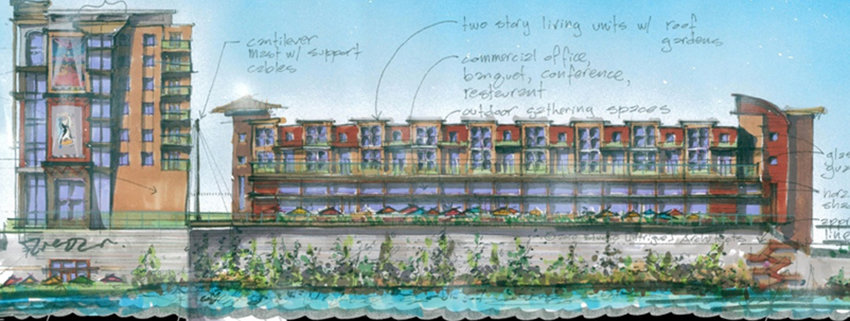
The developer who planned to build an extended stay hotel on the former Deluxe Inn site in downtown Lansing has withdrawn the offer, blaming the proposed Lansing Board of Water & Light substation and other concerns.
"The Electric Sub Station to be built across the street is not conducive to having a 4 story (40' tall) zero lot line hotel building adjacent to 50' high electric towers and lines, " the developer said in an Oct. 13 email to Eric Schertzing, chairman of the Ingham County Land Bank.
The developer, M2M2 LLC of Grand Rapids, optioned the property with the Land Bank in February. The City Council approved the substation in late September.
Schertzing, who is also the county treasurer, said despite the set back, he believes the property can still be developed to the benefit of the community. He said he met last week with “another broker and developer” who “was very excited about the possibilities for the property.”
He said he was “always concerned” about an extended stay development on that location. “I think that is more a suburban thing."
He also discounted the claim the substation played a role in the withdrawal of the offer, noting that it had “never been an issue” prior to the Oct. 13 email.
Mike Huszti, a broker handling the deal for the developer, cited four reasons for withdrawing.
In addition to the controversial Central Substation project slated for the Scott Center and Park, on the west side of Washington Avenue across the street from the site, Huszti said the developer withdrew because property taxes would be higher than expected, development rules increased the cost of the project and a market study had downgraded the property as an acceptable location for an extended stay hotel.
Karl Dorshimer, director of business development for the Lansing Economic Area Partnership, said that the “City Planning Dept requested that the Developer modify their normal suburban design into a more urban design, using high quality materials. As a gateway property it is very important that the Development meets the vision the City, and REO Town have for the site.”
He said that despite the project's failure, the property “has generated a lot of interest from multiple developers.” He said as additional developments come to downtown and REO Town, the property will become “more and more appealing.”
Despite the citation of the Central Substation as a reason for the withdrawal, Dorshimer said LEAP was unaware of concerns from the developer about the electrical infrastructure until the Oct. 13 letter to the Land Bank.
Community activists are pointing at the failed development as evidence the Central Substation project will harm the area.
“Preservation Lansing has been saying all along that replacing a park with a substation would not fit into the surrounding area and that it does not meet the conditions of the special land use permit,” said Dale Schrader, president of the group.
Activists had suggested the Deluxe Inn site as a potential for the Central Substation multiple times. However, because it was under an option at the time, it was ruled out, city and BWL officials said. BWL officials also said even if the property were available, the 2.2-acre site was too small to house the substation. They said it would require purchasing additional property, including apartments on the eastern side of the property. Those apartments would have to be demolished.
The collapse of the hotel project is the latest entry in the storied history on this property. The Land Bank purchased the property from foreclosure in 2009. Before that, the hotel on the site was the source of drugs, violence and commercial sex work, city officials said at the time. The hotel was demolished in 2010 and the property has sat empty since.
Ryan Wert, executive director of the commercial association for nearby REO Town, said the group was “disappointed” but looked forward to new possibilities on the site.
“We hope that this creates an opportunity for other interested developers to pursue the property, and would love to see an iconic mixed use structure on the site in the future,” Wert said.
Such an “iconic” development was envisioned in 2010 by the Land Bank and others: a $30 million, seven-story and four-story building complex that form an L-shape along Washington Avenue and the Grand River. It included a mixed-use” development with permanent condos and rental apartments as well as commercial and retail space at the lower levels.
The rendering does not show it, but there is a design for a 20-foot deck that extends beyond the riverbank that is about 30 feet above the water level.
There would be roughly 153,000 square feet set aside for residential use (rentals, condominiums, townhomes and storage) with another 32,000 square feet for office and retail use. About 480 parking spaces would fit on ground level and below ground.
The housing would be divided between 132 studio, one- and two-bedroom apartments, nine or 10 condos and a couple of two-story town homes with decks and patios on the river.
Schertzing said that project was a way to “provide a vision” for the property. “It was trying to get a conversation going.”
Support City Pulse - Donate Today!
Comments
No comments on this item Please log in to comment by clicking here